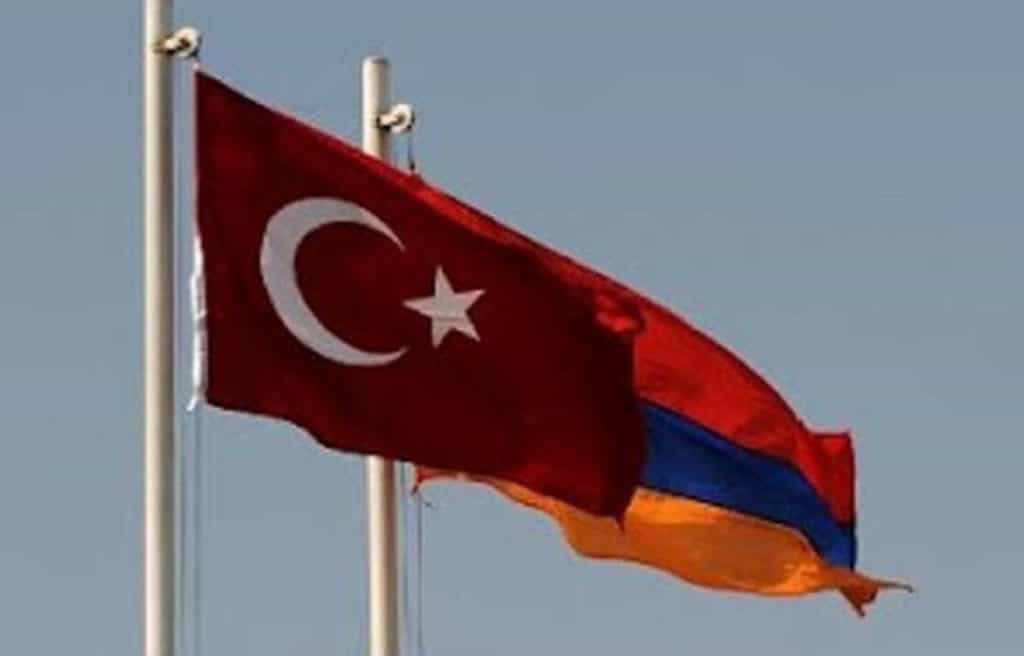Anton Evstratov
One of the major events last year in the South Caucasus region was the appointment of special envoys from Armenia and Turkey to normalize bilateral relations. The first meeting between the representatives of RA and RT was held on January 14. There are also plans to restore direct flights between the countries. Armenian-Turkish normalization is perceived as one of the most anticipated events of 2022.

Turkish Foreign Minister Mevlut Cavusoglu announced the appointment of envoys to the Turkish parliament on December 13, after months of public statements hinting at a rapprochement, not only between Armenian Prime Minister Nikol Pashinyan and Turkish President Recep Tayyip Erdogan, but also with Ilham Aliyev, leader of Azerbaijan and Turkish ally.
The process of normalization, and laying of the groundwork for eventual reconciliation, is part of a broader effort, following the Nagorno-Karabakh conflict of 2020, to restore regional communications in the South Caucasus region.
According to some pro-Western Armenian experts, this is important for both sides, as Armenia will end its isolation and closed borders to better adapt to the new reality arising from the conflict, including the loss of control over the vast territory of Artsakh.
The economic crisis in Turkey has also brought the issue of opening the borders to the forefront. According to political analyst Richard Giragosian, the return to diplomatic engagement between the two countries would be a victory for Turkey’s foreign policy and would mark the beginning of a positive development after months of political instability and economic crisis. This is especially important against the background of Turkey’s isolation in the NATO alliance and its estrangement from its traditional ally, the United States. Moreover, the normalization of relations with Armenia is also a component of Erdoğan’s more ambitious efforts at rapprochement with Israel, the UAE and other countries. For Ankara, normalizing engagement with Yerevan will provide diplomatic dividends in its relations with the West, especially the U.S., but also with NATO and the EU. In addition, the opening of the border with Armenia will provide a strategic opportunity to increase economic activity in the east of the country.
Normalizing relations with Armenia could also give Turkey a more active role in regional initiatives to restore trade and transportation routes in the region. The fact is that after the 44-day war in Artsakh, Turkey has never had the desired presence in the South Caucasus. For the time being, Turkey only takes part in the formal joint monitoring group with Russia in Akna (Aghdam). Ankara is also not involved in the working group to unblock communications. That is why Erdogan and Aliyev are so actively promoting the idea of a 3+3 regional format (Armenia, Azerbaijan, Georgia + Russia, Turkey and Iran), to somehow become a participant in the current processes in the South Caucasus. It should be noted, however, that after Azerbaijan’s victory in Artsakh Turkey has become the main supplier of weapons to the region, replacing Russia in this capacity, and its even greater integration is a challenge for Moscow.
It should also be recalled that normalization is not a new policy. The sides previously negotiated in 2008-2009, which led to the signing of two diplomatic protocols in Zurich. This process, launched with Swiss mediation, was undermined by Azerbaijan, which demanded a condition for Armenia to give up Karabakh. Turkey, in turn, also conditioned Yerevan to give up its demand to recognize and condemn the 1915 Armenian Genocide, which is a matter of principle for the Armenian people. Today Armenia, as before, is committed to a policy of normalization “without preconditions,” and intends to simply open the closed border and establish diplomatic relations with Turkey.
Another task Erdogan solves, by normalizing relations with Armenia, is an electoral bonus for his government against the background of not only economic but also political crisis, presenting the situation as a solution to another national problem, and in this case the opposition will have nothing to respond with.
As for Armenia, the risks from the normalization of relations with Turkey exceed the possible benefits. Yerevan sees normalization simply as a first step, rather than reconciliation or rapprochement, which requires a longer period and deeper ties. In addition, the fundamental issues of genocide recognition and Artsakh’s independence remain unresolved.
If communications are unblocked and borders are opened, Armenia could become a transportation hub for the region, connecting not just its countries, but also the EAEU and the Middle East. On the other hand, Armenian business will face serious competition, which, according to today’s estimates, it cannot withstand. This threatens to turn Armenia into a second Georgia, depending almost entirely on Turkish-Azerbaijani capital, with a complete decline of the national production. Moreover, Turkey will have an additional economic level of influence on Armenia, in fact Ankara, when it would like to put pressure on Yerevan, could introduce a trade embargo, or close its routes of communication for the Armenian goods.
In addition to the threat to economic security, there is also a threat to military security. Despite numerous statements by Yerevan, Moscow, the U.S. and the EU, Azerbaijan does not give up the idea of an extraterritorial “Zangezur corridor” through Armenia, which Aliyev promised to his people. Such an approach by Baku completely contradicts the existing signed trilateral treaties, but Turkey supports its ally in this dangerous adventure, and continues to threaten Armenia together with Azerbaijan.
The perception of the rapprochement with Turkey is extremely ambiguous in Armenian society. Despite the fact that some activists and politicians emphasize the benefits for the economy of Armenia, the majority of the country, on the one hand, fears that Armenia could become a semi-colony of Turkey, fully dependent on Turkey’s business, and on the other hand, it considers immoral to become closer to a state which allowed the extermination of over 1.5 million Armenians in the early 20th century, and which has neither recognized nor condemned this historical episode so far. Moreover, Turkey’s assistance to Azerbaijan, during the 44-day war, does not ease the attitude towards the prospect of free Turkish-Armenian interaction among most Armenians, both in Armenia and in the Diaspora.
Under these circumstances, it seems inappropriate for Armenia to start a dialogue with Turkey. At present Armenia and Azerbaijan have not yet begun border demarcation and delimitation, Azerbaijani armed forces remain on Armenia’s territory, negotiations on Karabakh are suspended, and Ankara’s unconditional support for Baku remains. On these issues there are no public signs of positive talks between Armenia’s leaders, but there may be behind-the-scenes contacts of which nothing is known at the moment.
Author: Anton Evstratov (Russian historian, journalist and journalist living in Armenia, lecturer at the Department of General History and Foreign Regional Studies at the Russian-Armenian University in Yerevan).
(The views expressed in this article belong only to the author and do not necessarily reflect the views of World Geostrategic Insights).







